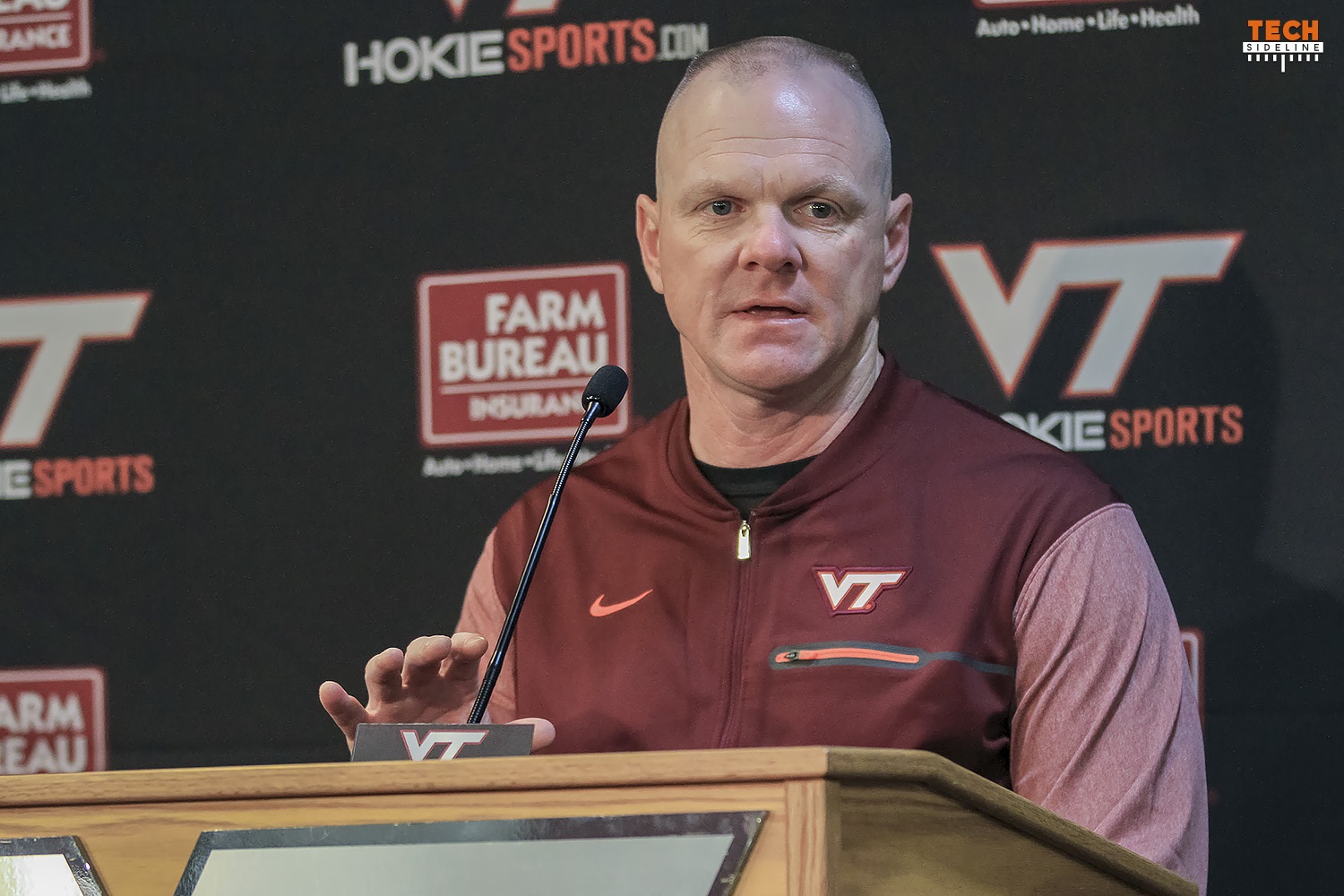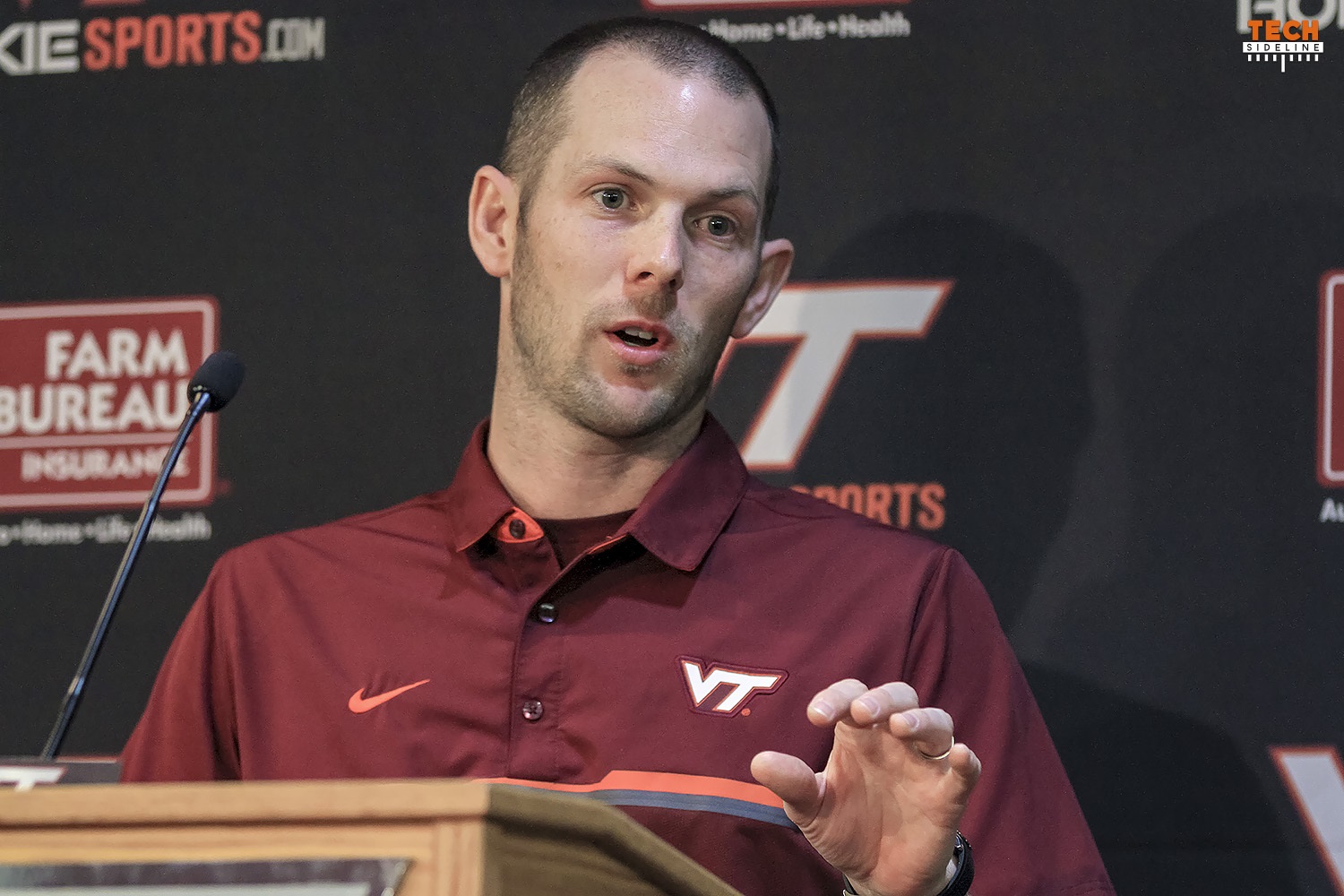
Wednesday afternoon following coach Justin Fuente’s comments on national signing day, the Virginia Tech baseball coaching staff fielded questions from the media. Head coach John Szefc, pitching coach Ryan Fecteau, and hitting coach/recruiting coordinator Kurt Elbin took the podium at Baseball Media Day.
The trio spoke on a variety of topics ranging from the process of the construction at English Field at Union Park, to opening day for the Hokies being just over a week away. The Hokies open the season on February 16 in Myrtle Beach for the Coastal Carolina tournament, where they will face Coastal Carolina, South Alabama, Oklahoma and Kansas State.
Transition to Blacksburg
Szefc, Fecteau, and Elbin are all beginning their first year in Blacksburg. Since the beginning when he was offered the job, Szefc realized he needed to be unflappable with all the change that was happening with the Virginia Tech baseball program.
“The biggest thing that’s associated with taking over this position since June is that you have to have patience,” Szefc said. “You have to have patience with the building procedure, you have to have patience with our inner workings, our player building procedure. It’s difficult in this day and age because it’s not about patience. It’s about instant gratification. The one big thing that I’m always trying to remind myself as an older coach now is to be patient with things.”
One area that immediately helped with a smooth transition for Szefc was the attitude of the returning players. He described how the players presented no obstacles for him from day one, and how there were no big egos on the team that hindered the process.
“It’s helped a lot because usually when you get kickback, it’s because of monstrous egos,” Szefc said. “If you don’t have those hurdles to jump over, you can work a lot more efficiently. You can get the product you want faster than if you have to deal with a lot of guys who have those egos. The fact that we haven’t dealt with that has also helped with the transition because the older, more experienced players on the team, they’re the guys who really carry the torch every day, whether people think that or not, the experienced players in any program regardless of sport are the ones that dictate the team.”
Last year, Virginia Tech had their struggles on the mound and with the glove in the field, but its offense remained steady throughout, smacking 84 home runs and maintaining a .478 slugging percentage as a team. It could have been intimidating for Elbin to take control of the lineup as a new coach, but he talked about how the players have welcomed him in, making for a pleasant transition.
“It’s good to have an older nucleus of guys who have played and performed at a pretty good level in this league,” hitting coach Kurt Elbin said. “Coming in and evaluating and watching those guys was pretty easy. The one thing that’s never easy is trying to put your stamp on what you think that offense should look like. Our older guys have done a really good job of accepting the way we want to do our business and go about it. I tell them every day that I’m thankful to work with them because [Sam] Fragale and [Tom] Stoffel and Jack Owens and [Joe] Freiday and just the older guys that we’ve had a chance to really just watch work is good for us, but it’s also good for our younger guys.”

Building a Culture
Once Szefc and company arrived on campus, the focus moved from settling in to building a culture. From the start, ‘Build it in Blacksburg’ has been the rallying cry for Szefc. While there’s a lot of physical building going on with the facilities, Szefc explains that the phrase means so much more.
“That whole term [Build it in Blacksburg], I think a lot of people look at it and liken it to building a stadium and all the facility changes, and that’s a part of it, but really to me the bigger part of it is building the inner workings of the program,” Szefc said. “The culture of it, the attitude of it, how guys come to play, how prepared they are, how consistent they are, how dependent they are. It’s all about the players. If the players are good and dependable. If they’re the same guys every day and they have strong personalities and expect to have success, then everything else takes care of itself.”
Anytime a new coaching staff takes over, they’ll have to go through a bit of a power struggle to get the players to buy in and commit to the vision that’s set in place. Once the players have bought in, that’s when the coaches can really begin to build the culture one step at a time.
“As a coaching staff we’ve talked about getting the guys to buy into playing hard every day, just playing with a ton of energy, and being consistent,” pitching coach Ryan Fecteau said. “If we know what we’re going to get out of them every single day, then hopefully we know where we can put them in positions to succeed and use their strengths.”
Despite all of this, Szefc understands that he can’t be overbearing on the rest of his coaching staff or the players if they’re going to believe in the process he’s laid before them and believe in what he’s preaching for the program. As a result, Szefc is a proponent of delegating responsibilities to his coaches and players and letting them take the reins.
“I think a lot of head coaches think they have to micromanage people and have their hand involved in everything,” Szefc said. “I really don’t try to do that. I try to let our staff work. We have really good assistants that will all be good head coaches in the near or distant future. We sink or swim on decisions that our entire staff makes. We try to do it the same way with the players. If I went out there and micromanaged all those players, they wouldn’t like that too much. We try to set a standard, throw out the rules and try to let them do their thing. As a staff, I don’t think we like to hang over people’s shoulders and make them robots.”

Working with Players
Once the coaching staff has arrived on campus and started to build a culture, then they get a chance to dive in deeper with the players and really establish a connection with them. The Hokies feature eight seniors on their roster, which leads to a lot of experience that plenty of other programs don’t possess. On the other end of the spectrum, there are 15 freshmen or redshirt freshmen, which leads to a rare combination where the lineup could be filled with guys who boast loads of experience and others with none whatsoever.
“We’re fortunate enough to have a small group of seniors on the team,” Szefc said. “They’re some of our better players. They’re certainly our more experienced players and they want their careers to end on a good note. We want their careers to end on a good note. We’re all working in the same direction.”
“The upperclass guys have been great as far as mentoring the underclassmen,” Fecteau said. “Usually it’s a little vice versa. It’s kind of like they keep their distance and the freshmen have to earn their way, but they’ve actually been really good at guiding them and teaching them as much as possible. They’ve almost been an extension of me as far as the pitching staff goes. They’ve done a really good job at mentoring those guys. We’re going to have to really lean on those guys this year. Joey [Sullivan] is going to be a really big piece out of the bullpen. [Connor] Coward will lock down Friday for us. He’s just one of those guys that really has to make that next step if he’s going to be an elite ACC Friday night starter.”
Like Fecteau mentioned, the coaches can rely on the upperclassmen to hold the team accountable. Elbin described a similar circumstance where he’ll use some of the returners to run the drills since he can’t be monitoring every moment.
“For me the new guy coming in, I kind of run some things through Sam [Fragale],” Elbin said. “I’m sure they’re sick of hearing my voice, so I’ll go to Sam, I’ll go to Jack [Owens], I’ll go to Joe [Freiday], [Tom] Stoffel, some of those older guys and just say ‘Hey, I think this is something you guys can attack a little bit here.’ That goes a lot with bringing some of the younger players along.”
While the work with the players on the field is a grind, without success off the field, they wouldn’t be in a position to be able to help the team. Part of Szefc’s mentality starts with helping his players become better men in the process, and that begins in the classroom. In the fall semester, the roster carried a 3.13 GPA, a staggering number considering it was the first semester in college for many of the players.
“If your player’s life is clean and structured off the field, it takes care of itself on the field,” Szefc said. “If it’s a zoo off the field, it’ll be a zoo on the field. It starts with the academics, especially at a place like Tech.”
The only thing that remains for Virginia Tech is putting all of the talk leading up to the season aside by taking the field for live action. They’ll get that chance on February 16 when the Hokies take on Coastal Carolina.
Follow the action all season long on Twitter @TSL__Baseball.





 Print
Print







I love what I am hearing!! Batter up! ❤️🦃⚾️
Coach Szefc is going to do a terrific job. Just give him 2-3 years.